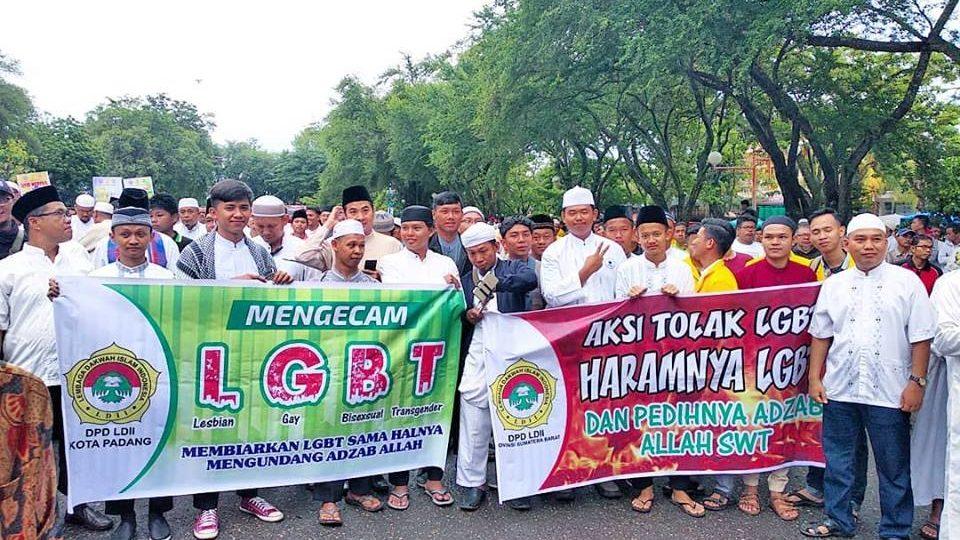Sunday saw a huge anti-LGBT rally in the West Sumatran capital of Padang led by the city’s own mayor, the latest in a series of state-sponsored demonstrations against the scapegoated minority that many speculate is fueled by political interests.
Officials in Padang and other cities have promised regulations to “cleanse” LGBT elements from their communities, but homosexuality and LGBT behavior are not criminal acts in Indonesia (except in sharia-enforcing Aceh). So instead of being arrested by the regular police, gay and transgender individuals in those cities are classified as a “social sickness” so that their Civil Service Police (Satpol PP) can detain those they “suspect” of being LGBT.
Satpol PP In Padang, have detained 16 individuals in anti-LGBT raids in recent weeks, after which they handed the “suspects” over to the city’s Social Services Agency to receive bina (“guidance”).
https://www.youtube.com/watch?v=0g1zah3cPI0
So what exactly does this guidance for LGBT individual consist of? The head of the Padang’s Social Service Agency, Amasrul, said that the 16 were given bina by both psychologists (the Indonesian Psychiatric Association has been criticized by the international medical community for classifying homosexuality as a mental disorder) as well as religious figures.
Amasrul said that after being sent home, Social Services would follow up at the home of the “perpetrators” to make sure they did not repeat their actions.
But most disturbing of all, Amasrul said that the government had agreed to work with certain civil society organizations (ormas – short for “mass organization” and often associated with hardline Islamic community groups) to perform ruqya (“exorcism” in Islam) on LGBT people in the area.
So how are exorcisms related to LGBT behavior? Well, here’s the explanation from Lucky Abdul Hayyi, a member of Padang’s Majelis Mujahidin (Mujahidin Council), which is one of the ormas the government is working with:
“We have prepared ruqyah experts for [the Social Services Agency]. Usually these men are possessed by female genies, this is what many of us have found with LGBT perpetrators. In addition, the waria (female transgender individuals) will also be fostered by the military. Hopefully in the near future this program can implemented in the city of Padang,” he said as quoted by West Sumatran news portal Covesia.
The concept that gay men or transgender women are inhabited by female genies (aka djinn, supernatural beings in Islamic mythology) can be found in many parts of Indonesia with many religious organizations offering ruqya as a “cure” for LGBT behavior.
New Naratif has a great article on the subject in which they interview a gay man who endured one such ruqya (as well as many other “cures”), which he described as involving being read verses from the Quran, being prayed over, getting pummelled, massaged, and bathed in holy water — “But it had no effect whatsoever,” the interviewee said.
While the idea that djinns can cause mental disorders and that ruqya can “cure” them is accepted by many Indonesians (there is even a whole TV show dedicated to the subject), this is the first time we can recall seeing a government institution validate the concept by saying they would use it as a means of treating LGBT “suspects” detained by the police.
It seems that no state-sponsored exorcisms have taken place, but if nobody speaks up against them, we suspect it’s only a matter of time.
Politicians in places like Padang and several other cities in West Sumatra and Indonesia say they will continue to push for anti-LGBT legislation from the national government but some have also suggested using customary law punishments, such as parading “suspects” through the street and exiling them from their villages, as another possible alternative.
The recent increase in anti-LGBT hysteria, the worst the country has seen since the height of the last LGBT moral panic 2016, has been attributed by some to election year politics and cynical leaders looking to score easy electoral points with increasingly conservative voters by scapegoating the vulnerable minority group.
Their non-religion based arguments for persecuting LGBT individuals generally focus on the spread of HIV/AIDS, but studies have shown that the country’s attack on the gay community have driven them further underground in fear, preventing them from accessing medical outreach programs which is the actual cause for the country’s worsening HIV/AIDS infection rates.





